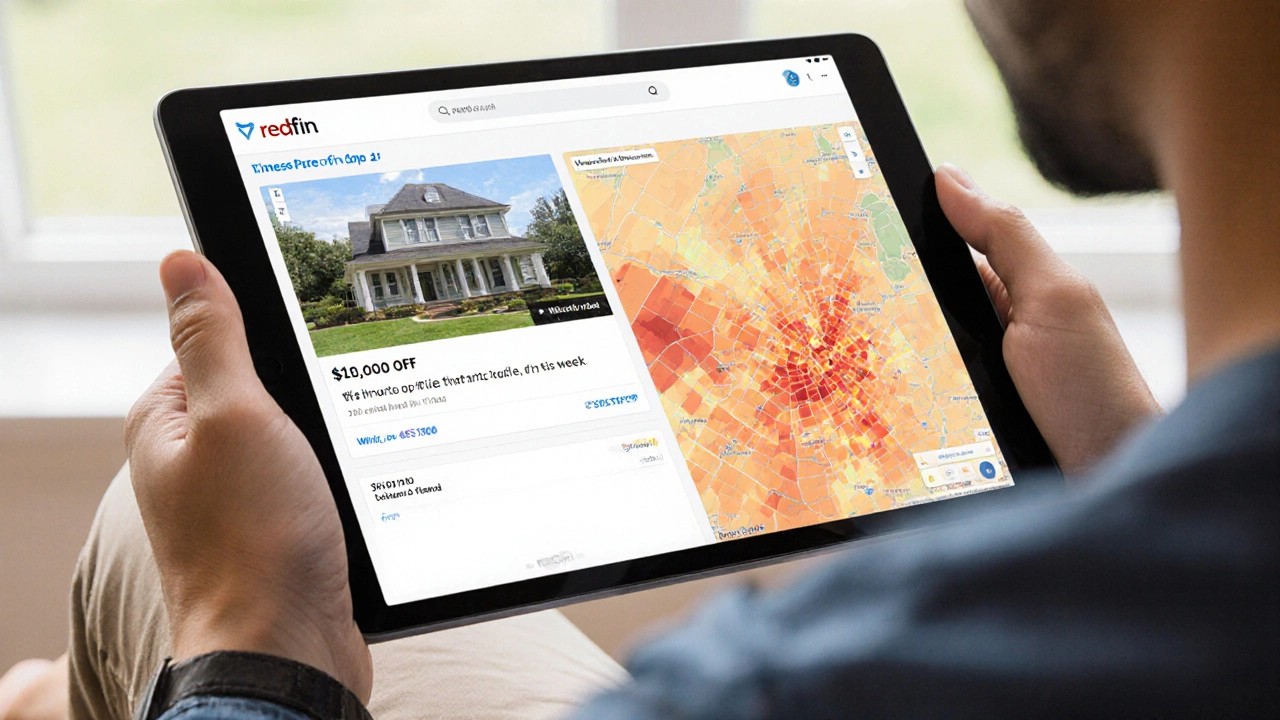Best Websites to Find Properties for Sale in 2025

Oct, 30 2025
Mortgage Affordability Calculator
Monthly Payment Estimate
Affordability score based on typical income
If you're looking to buy a home, you don't need to rely on a real estate agent to show you every listing. The best websites for finding properties give you direct access to thousands of homes, filters that actually work, and tools that save you hours. But not all sites are created equal. Some overload you with ads. Others hide price changes or outdated listings. In 2025, the top platforms have gotten smarter, faster, and more transparent - if you know where to look.
Redfin: Best for Transparent Pricing and Agent Insights
Redfin stands out because it shows you exactly what’s happening with a home - not just the listing price. It tracks price drops in real time, so you’ll know if a house dropped $20,000 last week. You can also see how many days it’s been on the market and whether it’s received multiple offers. Unlike Zillow, Redfin’s agents are salaried, not commission-based, which means they’re less likely to push you toward a higher-priced home just to close a deal.
Redfin’s heat maps show neighborhood trends. If you’re looking at a suburb in Atlanta or a street in Austin, you can see which blocks are selling fastest and at what price points. It also lets you schedule showings directly through the app. No calling around. No waiting days for a response. In 2025, Redfin handles over 60% of its showings through its own agents, making the process smoother than ever.
Zillow: Best for Volume and Market Trends
Zillow still has the largest database of listings in the U.S., with over 110 million homes listed - including off-market and pre-foreclosure properties. It’s the go-to for people who want to see everything, even if some listings are outdated. Its Zestimate tool gives you a rough idea of a home’s value, based on recent sales in the area, square footage, and school ratings.
But here’s the catch: Zillow’s Zestimates can be off by 10-20% in fast-moving markets like Denver or Seattle. That’s why you should treat it as a starting point, not a final number. Zillow also lets you set up alerts for new listings, price drops, or homes that match your exact criteria - bedrooms, lot size, walk score - and sends them to your phone within minutes.
If you’re doing broad research, Zillow is unbeatable. If you’re ready to make an offer, pair it with Redfin or Realtor.com for more accurate data.
Realtor.com: Best for Official MLS Data
Realtor.com pulls its listings directly from the Multiple Listing Service (MLS), the same database real estate agents use. That means fewer outdated or duplicate listings. If a home is listed in the MLS, it’s on Realtor.com - usually within 24 hours. That’s faster than Zillow or Redfin in some markets.
The site also shows you detailed property histories: when it was last sold, how much it sold for, and whether it had major renovations. You can even see if the seller is motivated - Realtor.com flags homes that have been on the market over 90 days, which often means room to negotiate.
It’s the most reliable source for accurate square footage, tax records, and HOA fees. If you’re serious about buying, you should cross-check every home you like on Realtor.com before making an offer.

Trulia: Best for Neighborhood Insights
Trulia doesn’t just show you houses - it shows you what life is like around them. Its crime maps, school ratings, and commute times are updated weekly using public data. You can see how many parking tickets were issued on a street last year, or whether a nearby park has been renovated.
It also has a “Live Chat with Locals” feature where residents answer questions about noise levels, safety, or whether the area is good for families. One buyer in Portland used this to find out that a quiet-looking neighborhood had a weekly loud music event every Saturday night - something the listing never mentioned.
Trulia’s interface is clean and mobile-friendly. If you care more about the neighborhood than the kitchen backsplash, this is your best tool.
Compass: Best for High-End and New Construction
Compass isn’t just a website - it’s a tech-powered brokerage that works with top agents in luxury markets. If you’re looking at homes over $1 million, especially in cities like Los Angeles, Miami, or San Francisco, Compass has the most detailed listings. You’ll find drone footage, 3D walkthroughs, and floor plans with exact dimensions.
It also tracks new construction projects before they hit the MLS. Some developers list homes on Compass first, giving buyers early access. In 2025, Compass integrated AI tools that predict which homes are likely to sell quickly based on buyer behavior in your price range. If you’re competing in a hot market, this can give you a real edge.
The downside? Compass agents aren’t available everywhere. If you’re looking outside major metro areas, stick with Realtor.com or Redfin.
How to Use These Sites Together
Don’t pick just one. Use them like a team:
- Start with Zillow to see what’s out there and get a sense of pricing.
- Switch to Realtor.com to verify MLS accuracy and check property history.
- Use Redfin to track price drops and schedule showings.
- Check Trulia for neighborhood red flags - noise, crime, traffic.
- If you’re in a luxury market, go to Compass for exclusive listings and virtual tours.
Many buyers waste weeks visiting homes that don’t fit their needs because they didn’t cross-check data. One couple in Nashville fell in love with a house listed at $320,000. They checked Realtor.com and found it had sold for $285,000 two years ago. The seller had added a deck and a pool - but the tax records showed the home was still valued at $290,000. They offered $295,000 - and got it.

Red Flags to Watch For
Not every listing is real. Here’s what to watch:
- Photos that look too perfect - if the house looks like a magazine spread, ask for recent photos. Some sellers use AI-generated images.
- “Price upon request” - this often means the seller is testing the market or hiding a high price.
- Same agent listed on 50+ homes - that’s a red flag for a flippant or inexperienced agent.
- Listing hasn’t updated in 60+ days - it might be sold, withdrawn, or never real.
Always verify the listing with the county assessor’s website. Most counties have free public portals where you can check ownership, tax history, and building permits.
What’s New in 2025
AI tools are now standard on top sites. Redfin’s “Buyer Match” uses your past searches and saved homes to predict which listings you’ll love before you even click. Zillow’s “Trend Predictor” analyzes local economic data to show whether prices are likely to rise or fall in the next 90 days.
Some platforms now let you simulate mortgage payments based on current rates. If you’re looking at a $450,000 home and rates are at 6.8%, you can see your monthly payment - including taxes and insurance - without talking to a lender.
Mobile apps are faster than ever. You can snap a photo of a for-sale sign, and apps like Redfin and Zillow will instantly pull up the listing - even if it’s not online yet.
Final Tip: Don’t Skip the County Records
Even the best websites can miss things. A home might have a lien, an unpermitted addition, or a pending easement. These don’t show up on listings. But they show up in county records.
Go to your county’s property appraiser website. Search by address. Look for:
- Recent building permits
- Property tax assessments
- Liens or judgments
- Environmental hazards (like flood zones or asbestos)
This takes 10 minutes. It can save you thousands - or a lawsuit.
What’s the best website to find houses for sale in 2025?
There’s no single best site - it depends on your needs. Realtor.com has the most accurate MLS data. Redfin offers the clearest pricing and scheduling tools. Zillow has the largest inventory. Use all three together for the best results.
Are Zillow Zestimates reliable?
Zestimates are useful for a rough estimate, but they’re not accurate enough to base an offer on. In fast-moving markets, they can be off by 10-20%. Always verify with recent comparable sales from Realtor.com or Redfin.
Can I trust listings that say "price upon request"?
No. Listings with "price upon request" often hide high prices or are used by sellers who aren’t serious. They’re also common with scams. Stick to listings with clear, upfront prices.
How do I know if a home has hidden problems?
Check the county assessor’s website for building permits, tax history, and liens. Also, look for signs of unpermitted work - like extra rooms without permits or oddly shaped windows. A home inspector will catch most issues, but you should know the red flags first.
Is it better to buy through an agent or directly from the website?
You don’t need to pay an agent to use these sites - they’re free for buyers. But a good agent brings negotiation skills, access to off-market deals, and local market knowledge. If you’re new to buying, pair the websites with a buyer’s agent - they get paid by the seller, so it costs you nothing.